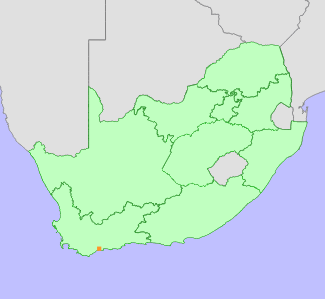|
Scientific Name | Leucospermum fulgens Rourke |
Higher Classification | Dicotyledons |
Family | PROTEACEAE |
Common Names | Potberg Pincushion (e) |
National Status |
Status and Criteria | Critically Endangered B1ab(iii,v) |
Assessment Date | 2020/06/09 |
Assessor(s) | A.G. Rebelo, D. Raimondo & L. von Staden |
Justification | Leucospermum fulgens has a restricted range known from only one location and has an extent of occurrence (EOO) and area of occupancy (AOO) of 44 km². Invasive alien plants are causing a continuing decline in habitat quality and number of mature individuals. This species is listed as Critically Endangered under criterion B. |
Distribution |
Endemism | South African endemic |
Provincial distribution | Western Cape |
Range | This species occurs in the Potberg section of De Hoop Nature Reserve, in the Western Cape Province of South Africa. |
Habitat and Ecology |
Major system | Terrestrial |
Major habitats | De Hoop Limestone Fynbos, Albertinia Sand Fynbos |
Description | It is confined to deep colluvial soils between Potberg to the north and limestone hills to the south. Mature individuals are killed by fires, and only seeds survive. Seeds are released after ripening, and dispersed by ants to their underground nests, where they are protected from predation and germinate following fire. It is pollinated by birds. |
Threats |
| In the past 10% of this species habitat was ploughed for pasture and alien acacias and gums planted. In 1987 the area was expropriated from landowners for military purposes and transferred to the De Hoop Nature Reserve. Although the aliens in the western portion of the subpopulation have been eliminated, a fair proportion of the range is still covered with gum plantations and alien acacias have increased in density in the eastern range despite clearing programmes. |
Population |
This species is confined to a single location, it occurs as many small stands of plants scattered across an 8 km range. The total population is estimated to be between 5000 and 10 000 plants. There is evidence that the species moves into old fields with other Fynbos elements, and the old lands should be restored with a view to increasing the population numbers. Dense invasive aliens in the eastern portion of its range are suspected to be causing an ongoing decline to the population.
|
Population trend | Decreasing |
Conservation |
| It is confined to De Hoop Nature Reserve. |
Assessment History |
Taxon assessed |
Status and Criteria |
Citation/Red List version | | Leucospermum fulgens Rourke | CR B1ab(iii)c(iv) | Raimondo et al. (2009) | | Leucospermum fulgens Rourke | Vulnerable | Hilton-Taylor (1996) | | Leucospermum fulgens Rourke | Rare | Hall et al. (1980) | |
Bibliography |
Goldblatt, P. and Manning, J.C. 2000. Cape Plants: A conspectus of the Cape Flora of South Africa. Strelitzia 9. National Botanical Institute, Cape Town.
Hall, A.V., De Winter, M., De Winter, B. and Van Oosterhout, S.A.M. 1980. Threatened plants of southern Africa. South African National Scienctific Programmes Report 45. CSIR, Pretoria.
Hilton-Taylor, C. 1996. Red data list of southern African plants. Strelitzia 4. South African National Botanical Institute, Pretoria.
Manning, J.C. and Goldblatt, P. 2012. Plants of the Greater Cape Floristic Region 1: The Core Cape Flora. Strelitzia 29. South African National Biodiversity Institute, Pretoria.
Raimondo, D., von Staden, L., Foden, W., Victor, J.E., Helme, N.A., Turner, R.C., Kamundi, D.A. and Manyama, P.A. 2009. Red List of South African Plants. Strelitzia 25. South African National Biodiversity Institute, Pretoria.
Rebelo, T. 2001. Sasol Proteas: A field guide to the proteas of southern Africa. (2nd ed.). Fernwood Press, Vlaeberg, Cape Town.
|
Citation |
| Rebelo, A.G., Raimondo, D. & von Staden, L. 2020. Leucospermum fulgens Rourke. National Assessment: Red List of South African Plants version 2024.1. Accessed on 2025/12/23 |
 Comment on this assessment
Comment on this assessment

